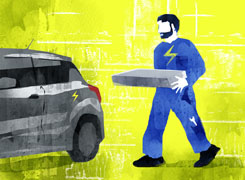Shekhar Kumar | Answer |Ask -Follow
Leadership, HR Expert - Answered on Apr 29, 2024
He has also mentored middle and senior management professionals for leadership positions and guided them in career development.
Shekhar has a bachelor's degree in business management from Magadh University, Bihar, and a master's degree in human resource management from Annamalai University, Tamil Nadu.... more

Hello Sir, I am 34 years old, doing job at CPP power plant of steel plant as Instrumentation Engineer. I can't find any fun doing maintenance job. So much pressure in this job.Shal I go for sales engineer or normal sales job. Will this suitable for me? I can't decide what to do? Please suggest.
Ultimately, the "better" option depends on your interests, strengths, and career objectives. If you enjoy blending technical expertise with sales skills, solving complex problems, and working closely with clients in technical fields, a sales engineer role may be a good fit. On the other hand, if you excel at building relationships, driving sales outcomes, and thrive in a fast-paced, results-oriented environment, a traditional sales job may be more suitable. A sales engineer job is more promising considering factors such as job responsibilities, earning potential, career advancement opportunities, and personal fulfillment.
You may like to see similar questions and answers below
Shekhar Kumar | Answer |Ask -Follow
Leadership, HR Expert - Answered on Apr 23, 2024
Shekhar Kumar | Answer |Ask -Follow
Leadership, HR Expert - Answered on May 03, 2024
Nayagam P P |10849 Answers |Ask -Follow
Career Counsellor - Answered on Jun 25, 2024
Onkar Singh | Answer |Ask -Follow
Career Management, Skills Development Expert - Answered on Sep 10, 2024
Dr Dipankar Dutta |1837 Answers |Ask -Follow
Tech Careers and Skill Development Expert - Answered on Dec 05, 2025
Dr Shyam Jamalabad |108 Answers |Ask -Follow
Dentist - Answered on Dec 05, 2025
Dr Shyam Jamalabad |108 Answers |Ask -Follow
Dentist - Answered on Dec 05, 2025
Dr Shyam Jamalabad |108 Answers |Ask -Follow
Dentist - Answered on Dec 05, 2025
Dr Dipankar Dutta |1837 Answers |Ask -Follow
Tech Careers and Skill Development Expert - Answered on Dec 05, 2025
Ulhas Joshi |280 Answers |Ask -Follow
Mutual Fund Expert - Answered on Dec 05, 2025
Dr Dipankar Dutta |1837 Answers |Ask -Follow
Tech Careers and Skill Development Expert - Answered on Dec 04, 2025
Ravi Mittal |676 Answers |Ask -Follow
Dating, Relationships Expert - Answered on Dec 04, 2025
Anu Krishna |1745 Answers |Ask -Follow
Relationships Expert, Mind Coach - Answered on Dec 04, 2025
Anu Krishna |1745 Answers |Ask -Follow
Relationships Expert, Mind Coach - Answered on Dec 04, 2025




























